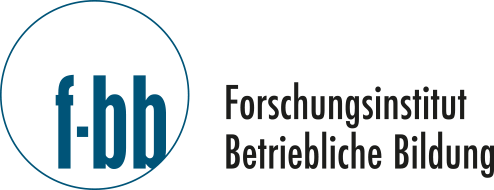The future viability of our vocational education and training (VET) system requires structural development as well as innovative offerings for special target groups and the continuous adaptation of its content and methods. With its specialist expertise, f-bb covers a wide range of VET-related topics.
Acquiring and developing professional skills
In its work on identifying and developing the kinds of professional skills needed in the future, f-bb realises and analyses approaches to assessing professional competence. Given the demographic changes and the constantly evolving workplace, non-formal skills and those acquired informally are becoming increasingly important. The aim is to ensure that assessment results are meaningful, not only with regard to gainful employment, but also with regard to possible qualifications or further education and training.
Innovations in vocational education
In the field of innovations in vocational training, f-bb supports the modernisation of Germany's apprenticeship and vocational education and training systems. Demographic change, the need for sustainability, digitalisation, and Industry 4.0 are all key factors driving the need for further development.
Learning and working in the digitalised world
In its work on learning and working in the digitalised world, f-bb examines the effects of digitalisation on work activities and processes as well as vocational education and training. The aim is in particular to recognise the need for change at an early stage, integrate the necessary structures and measures for developing the required skills into training, further education, and personnel and organisational development, help transform professional and qualification profiles accordingly, and support operational innovation and development processes.
Inclusion and vocational rehabilitation
With regard to inclusion and vocational rehabilitation, f-bb is working to increase the opportunities for people with disabilities to participate in the vocational training system, because participation in working life is an important part of autonomous and independent living. The aim is for people with and without disabilities to be trained together in the existing apprenticeship system with prospects for graduating as fully qualified professionals in recognised trades.
Transitions and permeability
In its work on transitions and permeability, f-bb is addressing questions regarding the transition from school to work and the design of individual educational paths. This also includes transitions from apprenticeships to university and vice versa. The challenges that are addressed here includes mismatching, the shortage of skilled workers, high dropout rates in both university and apprenticeships, and cross-institutional cooperation at the local level. The focus is on the diversity of possible educational pathways, increasing educational opportunities, and facilitating reorientation along individual educational careers.
Migration and the labour market
In its work with migration and the labour market, one of f-bb's priorities is to make the vocational potential of immigrants transparent and promote it by consulting with companies and creating transparency for stakeholders. The aim is to facilitate access to Germany's training and employment market and to ensure equal opportunities through procedures to recognise foreign qualifications and offering qualification, counselling, and other services that meet specific immigrant needs.
International vocational education
In its work on international vocational training, f-bb is addressing the challenges that globalised markets are placing on VET. It is examining the possibilities and limits of a transferring the dual education system and participating in current efforts to make qualifications easier to understand internationally in order to facilitate cross-border recruiting.
